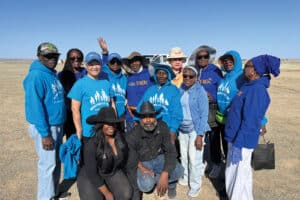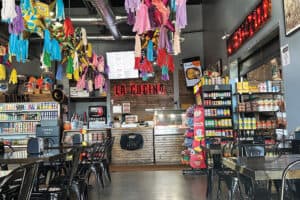Like many authors, Charles Henderson writes about what he knows best. A retired United States Marines officer, Henderson has written six books, each woven with a military theme. His most recent book, ëTerminal Impact,î was released in November.Henderson began writing at a young age. ìI wrote a short story in junior high school that everybody loved, and I donít even remember what it was,î he said. ìI would write stories for entertainment.î Born and raised in Artesia, New Mexico, Henderson married his high school sweetheart, Lillian, in December 1966.He enlisted in the United States Marine Corp in 1971; in 1993, he retired as a chief warrant officer. While serving in the military, Henderson attended Syracuse Universityís Newhouse School of Public Communications in New York. In 1981, he graduated first in his class from the Department of the Navy Photojournalism program.While Henderson attended Syracuse University, terrorists attacked a Marine Corp barracks in Beirut, Lebanon, on Oct. 23, 1983, killing 241 U.S. service members, most of whom were Marines. Henderson was sent to Dover Air Force Base in Delaware to help oversee the proper care and procedure for each service member who had died in the bombing, as the bodies returned home for burial in the United States. ìIt was my job to walk down the line (of caskets) and verify the names,î he said. ìAs I read each name, I could picture their faces. I knew them and had a strong bond.î He found it both challenging and an honor. ìIíve been on combat patrols and been shot at,î he said. ìBut of all my years in the Marine Corps, those two weeks stand out the most to me.îHendersonís experiences in the military are storylines for his books. His first book, ìMarine Sniper: 93 Confirmed Kills,î was released in 1986, with a follow-up book, ìSilent Warrior,î released in 2000. The nonfiction books feature Sgt. Carlos Hathcock, a Marine sniper during the Vietnam War. Henderson also published a third book, ìMarshaling the Faithful,î in 1993.He later pursued a second bachelorís degree in animal science at Cameron University in Oklahoma. After graduating in 1997, Henderson landed a job as director of commodities and communications for the National Livestock Producers Association, and moved to Peyton, Colorado. In 1999, he retired to become a full-time writer.To do research for his fourth book, ìGoodnight Saigon,î Henderson returned to Vietnam. ìI retraced all the battle sites of the final campaign of the Vietnam War ñ- Saigon to Hanoi,î he said. ìI interviewed the soldiers on both sides and the communist leadership Ö and then I interviewed the American commanders.î In 2006, he received the American Society of Journalists and Authorsí Outstanding Book award; and released another book, ìJungle Rules.îHenderson answered a few fun questions and a few related to the NFH January health care focus.NFH: What advice would you give to a young writer?Henderson: Believe in yourself. It is in your heart. It doesnít matter who reads it. It is an art. You are an artist. A writer is as much an artist as a painter, a singer, a composer, because you are taking nothing and making something. You are using your ideas Ö and it should stir the heart of the person who reads it. That is the definition of art. It has to make an impact. NFH: Who are your favorite authors? Henderson: I think the most influential author for me has been (Ernest) Hemingway. I donít like him as a person. I like him as a writer. I like Hemingway, F. Scott Fitzgerald, William Faulkner and Elmore Leonard. It is hard to pick. NFH: Do you have a personal hero? Henderson: John Glenn. He was the last real American hero. The devotion to his wife ñ- thatís a love story. He protected her. He loved her. He revered her. He was Mr. Clean Marine. He stood up for integrity and honor. He set an example. NFH: If you could time travel, which period would you visit ó past or future?Henderson: I would go to Paris in the 1920s, and hang out with the ìLost Generationî ó people like Gertrude Stein, Sylvia Beach, Ford Madox Ford, T.S. Eliot and Dorothy Parker.NFH: What do you think is the biggest health care issue in our country today?Henderson: I think it is medication. We are overmedicated. Doctors need to get back to homeopathic and naturopathic medicine. NFH: Do you think health care is a right or a privilege? Is it a necessity?Henderson: It is not a right, but it is a necessity. There has to be availability, but at the same time I need to be making my own choices. You (the government) may think you know what is best for me, but I should be able to make my own choices. NFH: Do you believe Congress should eliminate the Affordable Care Act?Henderson: Yes. It was a bad idea to start with because it is the government telling us what to do. It is the government taking control of our lives. Iím not a person who says there shouldnít be regulation. We donít need monopolies. Monopolies kill the free market. Health care costs are what are killing us. Not health care availability. Health care costs need to be addressed, and there needs to be fair competition in that market place. We can do better. NFH: What is your New Yearís resolution?Henderson: I guess mine is like most peopleís – to get healthy and lose weight.






